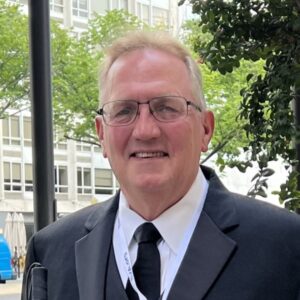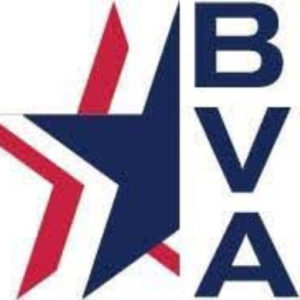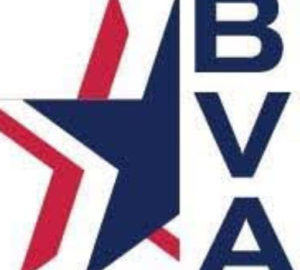
The BVA National Board of Directors has announced the appointment of Vernon F. Humphrey, PhD, as the Association’s 17th National Executive Director. Vernon’s new assignment is effective immediately.
Vernon became active in BVA after enrolling in the Ambassador training course. During the intensive training in 2021, he learned more about the organization, which “lit a fire in him” to participate at a much higher level. He attended his first national convention in August 2022 in Washington, DC, and decided to never miss another one.
“The camaraderie I missed from being a soldier was here within BVA all along,” he said.
Vernon resigned from teaching university courses in December 2023 and became a contractor for BVA, focusing on the Ambassador program. When additional duties came along, he accepted them. He began working full-time at BVA in May of 2024 as the National Program Coordinator and has never looked back.
Born in Frankfurt, Germany, in 1960 as an Army Brat, Vernon traveled with his father’s career. As he grew, he said, his hero was his dad and he wished to become like him, a retired Command Sergeant Major.
Vernon’s original plans were to attend college after high school graduation at age 16. He wanted to study Civil Engineering and then do survey work for a living. His plans were soon altered slightly when he enlisted in the Army with a delayed entry in September 1978 as a Biomedical Equipment Repair Technician.
He began his career in Pasadena, Texas, on June 12, 1979, with ten weeks of Basic Training occurring at Fort Sill, Oklahoma, followed by an assignment as a Military Occupational Specialty (MOS) 35G, Geospatial Intelligence Imagery Analyst at Fitzsimons Army Medical Center (FAMC) in Denver, Colorado. These were followed by assignments at Eisenhower Army Medical Center at Fort Gordon, Georgia, and as an Advanced Biomedical Equipment Repair Technician at the 97th General Hospital in Frankfurt, Germany. This was followed by six years of teaching Advanced Individual Training at FAMC.
Vernon served at the 34th General Hospital in Augsburg, Germany as the Non-Commissioned Officer in Charge (NCOIC/Acting Chief of Medical Maintenance) during Desert Storm. He was one of five not deployed to augment field hospitals to Operation Desert Storm and was licensed to drive all vehicles in the motor pool, including buses, and was a certified instructor for all.
“For considerable time, I was legally blind and didn’t know it,” he said. “When I was diagnosed with Retinitis Pigmentosa and became legally blind in 1992 with a 10-degree visual field, the doctor told me I was blind and I responded that I thought blindness was total darkness, proving how limited my knowledge was about blindness!”
At the 2nd General Hospital in Landstuhl, Germany, (deployed as Senior Maintenance advisor to Operation PROVIDE HOPE II to Bishkek, Kyrgyzstan), Vernon served on a humanitarian aid mission that managed the transportation of $13 million of medical equipment. He was also in charge of the distribution, installation, and training of the equipment. Additionally, he coordinated humanitarian missions to Moscow, Russia; Alma Ata, Kazakhstan; and to Tbilisi, Georgia, as the NCOIC and Acting Chief of Medical Maintenance and Medical Equipment Advisor for the 7th U.S. Army Medical Command.
During his final assignment as the NCOIC/Acting Chief of Medical Maintenance at Martin Army Community Hospital in Fort Benning, Georgia, he was medically retired as a Master Sergeant (E-8) on January 17, 1999.
Vernon’s awards and decorations consist of the Legion of Merit Meritorious Service Medal; the Army Commendation Medal 1OLC; the Army Achievement Medal 1OLC; Good Conduct Medal 5 Knots; National Defense Service Medal; Humanitarian Aid Service Medal; Non-Commissioned Professional Development, Ribbon 3; Army Service Ribbon; Overseas Service Ribbon 2; Das Abzeichen fuer Leistungen im Truppendienst (German Military Proficiency Badge Gold), and the Army Superior Unit Award.
Vernon joined BVA in 1999 shortly after his medical retirement. Although he had never heard of the organization, a BVA National Service Officer at the time took his case and got him 100 percent service-connected disability instead of the 30 percent he had been offered for depression. His BVA membership coincided with the help he had received.
Because of his vision problems and medical retirement, he had an advantage most do not—that of spending a few years watching his children grow.
“VA offered to send me back to school to ‘become a productive member of society’ and, after a battery of tests, I chose secondary school math,” he said. “I actually wanted to teach science, but a friend told me blind guys and Bunsen burners don’t go together well!”
After taking a course in public speaking, Vernon changed his major to Communication, graduating from Georgia’s Columbus State University (CSU) in 2005 with a Bachelor of Arts. He realized at that point that he loved learning and decided to enroll in a Master’s Program in counseling at CSU. However, he soon realized, after many years of being a Non-Commissioned Officer and a father, that counseling was not the right choice. Not wanting to stop learning, however, he enrolled at the University of Southern Mississippi and began a PhD program in Communication with a focus on Interpersonal and Intercultural Communication (2015). For his dissertation, he researched how couples change their communication patterns when one of them becomes blind.
Brenda, Vernon’s wife of 42 years, and he returned to Columbus, Georgia, to be near their three children and grandchildren as he completed his PhD and taught as an adjunct professor at Columbus State University, Georgia Military College, and Chattahoochee Valley Community College. During the same period, he published ten papers and made presentations at international, national, and state conferences. He was also the Chief Financial Officer of the American Communication Association and an inspector for the university’s Communication Department accreditation compliance office. He also served as the Chair of the Board of Directors of a local nonprofit organization, the Disability Service Center, in 2013, where he became active in advocacy for people with disabilities. He joined the National Federation of the Blind in 2013, where he met people to interview for his dissertation. He joined Rotary International in 2014 and further grew to “understand service before self.”
Vernon offered the following about his recent interpersonal relationships at BVA and the upcoming opportunity to serve as National Executive Director:
“I am honored to be selected as the next National Executive Director of the BVA. Don Overton has been an exceptional leader and mentor, and he is leaving big shoes to fill. I know from observation and history that leaders cannot lead alone. I look forward to gaining insight and wisdom from the staff, Board of Directors, and membership, without whom there would be no BVA. Although I am legally blind, I have sight through the voices of our membership. Together we will grow and improve the greatest blind veteran organization in the world.”


